Items
topic_interest is exactly
Mental Health
-
 2022-07-02
2022-07-02Taking Care of My Grandma During COVID
This is a story of taking care of my grandma during COVID. A lot of the time I was employed as a caretaker for my grandma overlapped with the height of COVID. -
 2022-05-26
2022-05-26Tucker Carlson tries to link Uvalde massacre to COVID "lockdowns" while rejecting gun restrictions
This is a news story from Salon by Meaghan Ellis. This is an opinion piece on what this author thinks about Fox News contributor Tucker Carlson and his approach to the shooting in Texas. The news story says that Carlson claims the lockdowns increased mental illness cases. Whether this is true remains to be seen, but from my own experience with lockdowns, I did have trouble adjusting. I had at least a few mental breakdowns over feeling like a prisoner in my own home. I don't think the lockdowns would trigger everyone into becoming a potential mass shooter, but I do not think they were healthy for many people either. People need human contact regularly, and being cut off from that and only having social media or very few people to see in-person would feel isolating. I think mental health is not paid attention to enough by public health officials when it comes to lockdowns. Mental health is still part of overall health. I do understand why the lockdowns happened, but I think many went on too long, which has had a bad effect on society. It is obviously not the only reason someone would have a mental illness, but for people that already did have mental issues, it made them worse. I have high functioning autism and without a good support system, I'd possibly be doing way worse. -
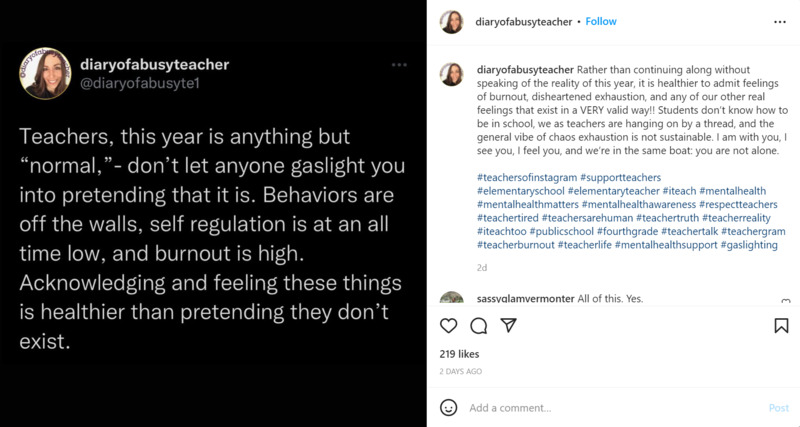 2022
2022Not a Normal Year for Teachers
This post shows an example of teachers supporting each other through the end of the 2022 school year. In many different places, people are acting as if life is "normal" again. Schools are not requiring masks or sanitation procedures, school is in session like normal, in-person assemblies, activities, and sports are occurring. However, teachers can definitely tell that everything is not normal, and our job continues to be increasingly more difficult. -
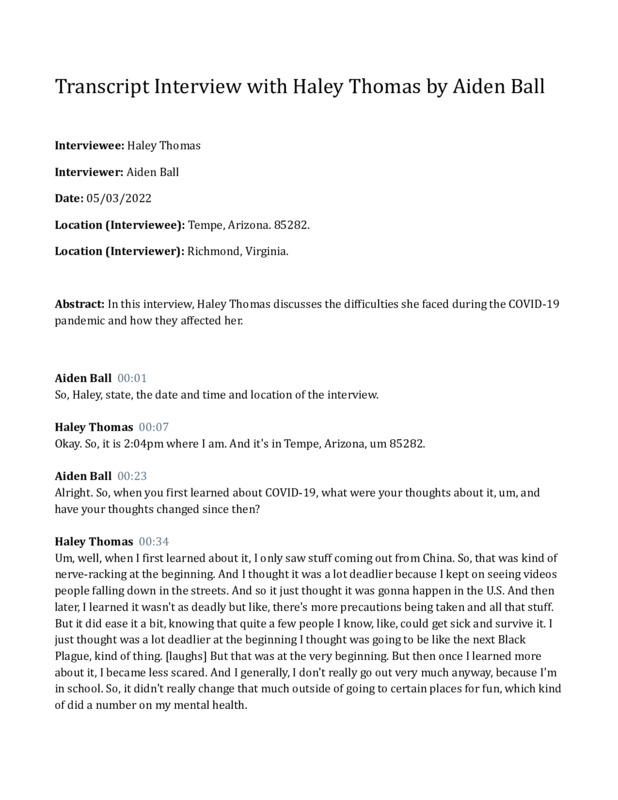 2022-05-03
2022-05-03Haley Thomas Oral History, 2022/05/03
In this interview, Haley Thomas discusses the difficulties she faced during the COVID-19 pandemic and how they affected her. -
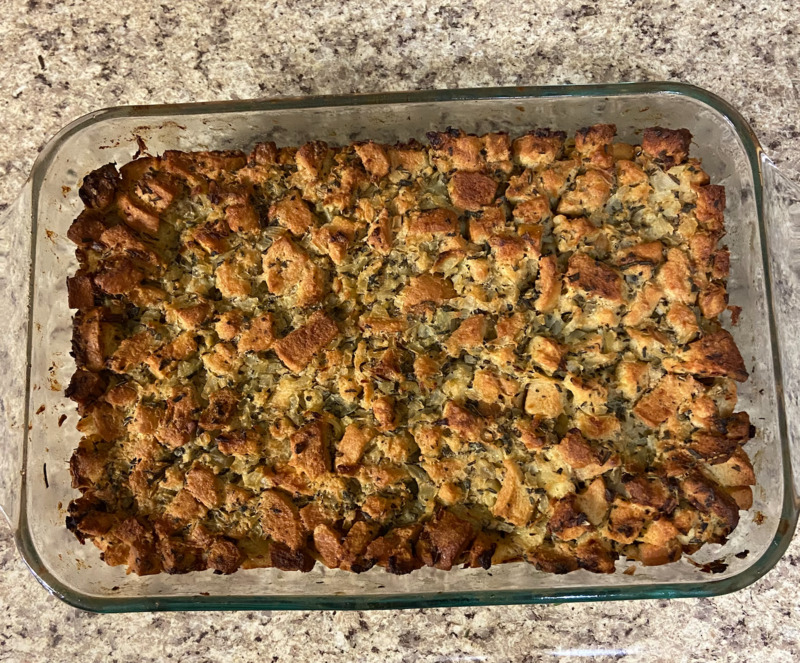 2020-11-26
2020-11-26Thanksgiving 2020
This was the homemade stuffing I made for Thanksgiving of 2020. Due to social distancing my family had in order to protect people, my extended family ate at two separate locations. For me, that meant going to my parent's place next door and dining with my aunt and uncle. My grandparents had their own celebration with other family members. One interesting twist to this was that we all ended up eating the same food between both houses because it was split up. This is why I ended up making a lot more stuffing than I normally would for Thanksgiving. In addition to this, I brought over some homemade cranberry sauce and homemade jam. I had learned to make canned jam during 2020, and I had some leftover to give. Everyone enjoyed the food I made and my aunt said it was some of the best stuffing she ever tasted, and she isn't really a big fan of stuffing. Sadly, the stuffing was not enough to ease tensions on the politics happening at the time. Other parts of the day included my family getting into a political discussion on the 2020 election. I had different views on it than my family did, so I left once that started. Later on in the evening, me and my husband went over to my in-laws. My sister-in-law was sick with COVID, so my father-in-law gave her food from the evening for her to take home. I was bummed about that, but people did not want to take their chances of getting others sick, which I understood. My father-in-law invited someone that year from Egypt for the occasion. It also turned into a political discussion there. I felt more comfortable voicing my opinions there than I did with my immediate family, but it was still draining. It made an otherwise okay evening into something that I don't want to think about. 2020 was a hard year for many people, and the election being so close to Thanksgiving made it very awkward. It has toned down since then, but I think people being locked down and exposed to constant social media and news coverage made it harder for people to actually discuss things. I think it's a good thing to be informed, but I do not believe the information overload many dealt with during 2020 was healthy. It even took a toll on me, as it made my mental health worse. Between the lockdowns, protests, and election, it was hard for me to take all at once. My only real solace was school and my husband, as both forced me to think of things not happening at the very moment. As a history major, I find it easier to think of events in the past than I do the present at times. It's why I really like the medieval period in Europe because it is far enough removed from the current era, so I am less likely to get heated about some of the topics brought up. With current events, I need to take a break at times. It was very obvious that the Thanksgiving from 2020 was not something that really made my mental health better. I enjoyed the food and the company, but I had a hard time wanting to discuss politics with people that I interact with regularly. It's one thing to discuss with strangers I might never see again, but completely another to talk about it with people that you need to interact with daily. Now that things are back to normal, for the most part, the tensions are not as high. I find myself being able to discuss politics again with some family members without it going badly. Overall, I would say that Thanksgiving 2020 was a good social experiment on how much overexposure to media and lockdowns can be detrimental to personal relationships. Seeing things behind a screen too often and being away from others takes a toll on humanity. This is why I was so glad when things started opening up again because people need to be out more and with others. As much as technology has helped us communicate, it still can't make up for the human interaction everyone needs. My own mental health has been much better since the ending of the restrictions and I don't want to go back to them again. -
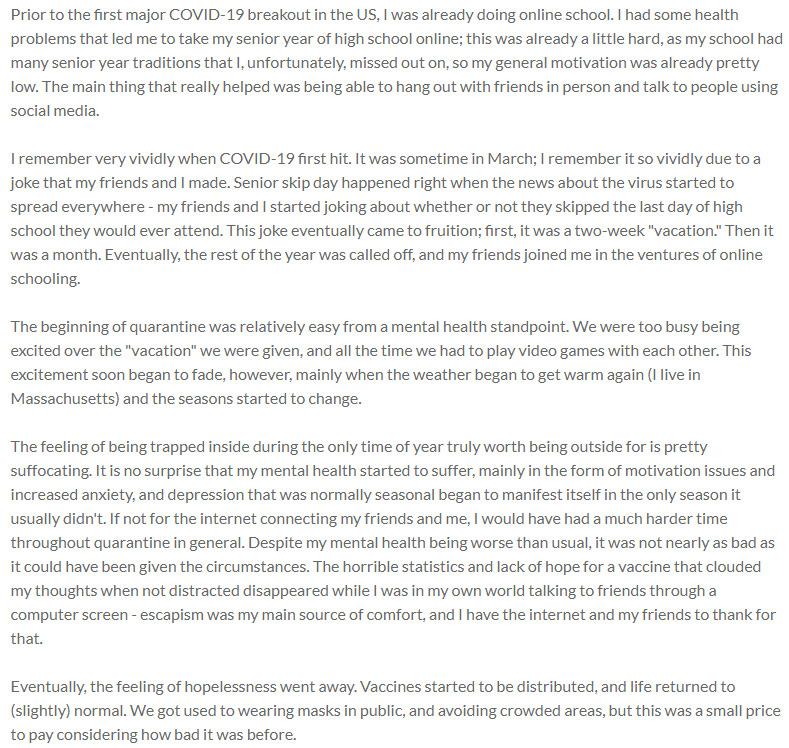 2020
2020How the Internet Saved My Mental Health During the COVID-19 Pandemic
Prior to the first major COVID-19 breakout in the US, I was already doing online school. I had some health problems that led me to take my senior year of high school online; this was already a little hard, as my school had many senior year traditions that I, unfortunately, missed out on, so my general motivation was already pretty low. The main thing that really helped was being able to hang out with friends in person and talk to people using social media. I remember very vividly when COVID-19 first hit. It was sometime in March; I remember it so vividly due to a joke that my friends and I made. Senior skip day happened right when the news about the virus started to spread everywhere - my friends and I started joking about whether or not they skipped the last day of high school they would ever attend. This joke eventually came to fruition; first, it was a two-week "vacation." Then it was a month. Eventually, the rest of the year was called off, and my friends joined me in the ventures of online schooling. The beginning of quarantine was relatively easy from a mental health standpoint. We were too busy being excited over the "vacation" we were given, and all the time we had to play video games with each other. This excitement soon began to fade, however, mainly when the weather began to get warm again (I live in Massachusetts) and the seasons started to change. The feeling of being trapped inside during the only time of year truly worth being outside for is pretty suffocating. It is no surprise that my mental health started to suffer, mainly in the form of motivation issues and increased anxiety, and depression that was normally seasonal began to manifest itself in the only season it usually didn't. If not for the internet connecting my friends and me, I would have had a much harder time throughout quarantine in general. Despite my mental health being worse than usual, it was not nearly as bad as it could have been given the circumstances. The horrible statistics and lack of hope for a vaccine that clouded my thoughts when not distracted disappeared while I was in my own world talking to friends through a computer screen - escapism was my main source of comfort, and I have the internet and my friends to thank for that. Eventually, the feeling of hopelessness went away. Vaccines started to be distributed, and life returned to (slightly) normal. We got used to wearing masks in public, and avoiding crowded areas, but this was a small price to pay considering how bad it was before. -
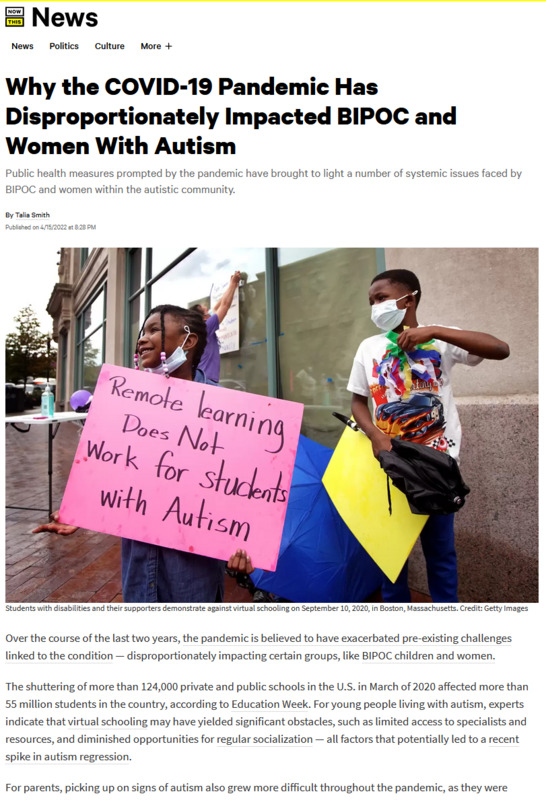 2022-04-15
2022-04-15Why the COVID-19 Pandemic Has Disproportionately Impacted BIPOC and Women With Autism
This is a news story from Now This News by Talia Smith. The author says that over the course of the pandemic, BIPOC and autistic women have been disproportionately affected. BIPOC parents who were not able to work remotely struggled to support their autistic children. One study led by the NIH analyzing the impact of the pandemic on BIPOC and low-income populations shows that families with a child living with autism witnessed an increase in sleep issues and behavioral problems, in addition to increased conflict between children and adults and the use of more severe disciplinary methods. In a study published in “Molecular Autism,” researchers revealed that for adults with autism, the pandemic brought relief from certain stressors like “sensory overload” and ultimately led to an “increase in solidarity.” -
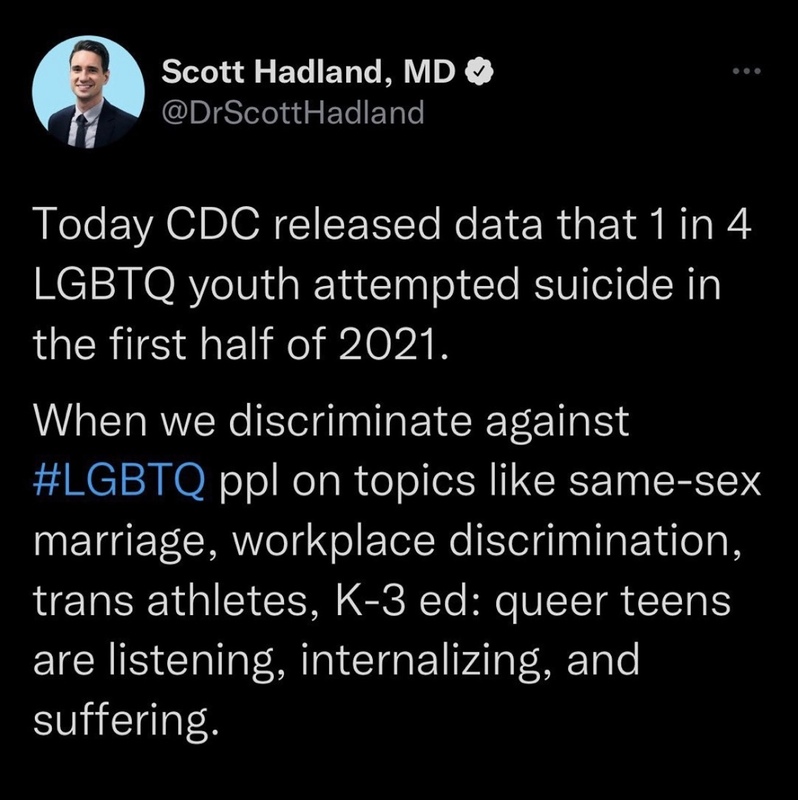 2022-03-31
2022-03-31Suicide Statistics Against Queer Youth
Suicide statistics against queer youth released by the CDC in the first half of 2021. According to the CDC, 1 in 4 queer children attempted suicide. -
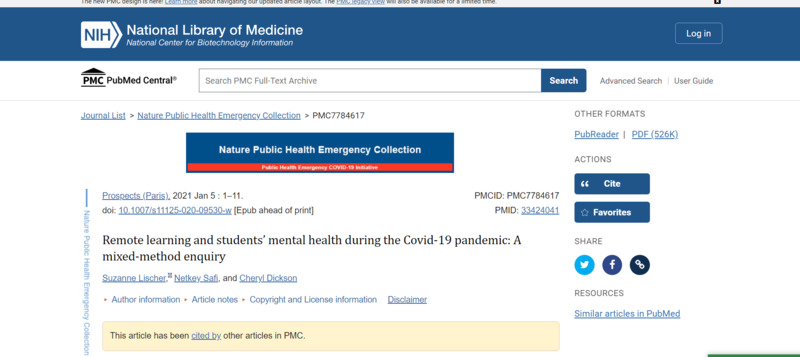 2021-01-05
2021-01-05The Covid Pandemic as a Senior in Highschool
The website that I am linking describes what happened to students all over the world in March of 2020 when all students in schools and universities had to go on lockdown and switch abruptly to complete online learning. This is an important covid-19 related topic to me because I was a senior in high school during that time, and I really struggled with my mental health, academic achievements, responsibilities, body image, and just overall my whole life. This article isn't as personal as it could get, but it gives a good historical and general idea of what student experience during the pandemic was like. -
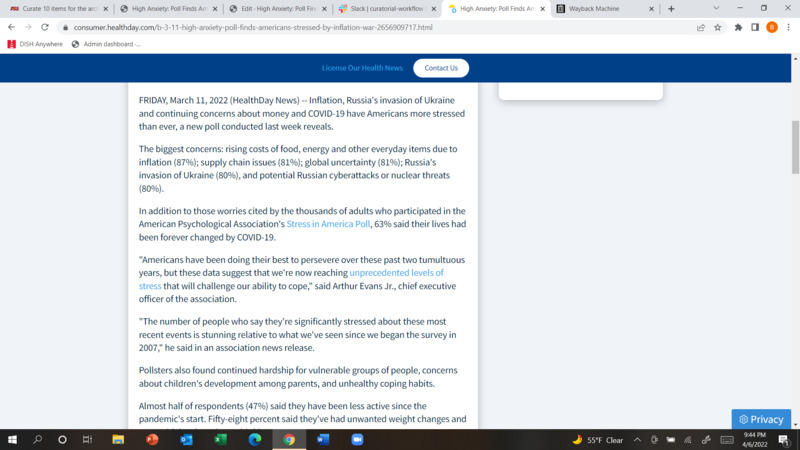 2022-03-11
2022-03-11High Anxiety: Poll Finds Americans Stressed by Inflation, War
This is a news story from Health Day by Robert Preidt. This is about a poll on what is making Americans most anxious. War, COVID-19, and inflation are at the top of what is making Americans feel anxious. Another thing the poll tells is that 63% percent said their lives changed forever due to COVID-19. 47% of people that took this poll also said that they have become less active compared to pre-pandemic. 58% said they had unwanted weight changes. Among those that gained more weight than they wanted, the average weight gain reported was 26 pounds. Others have said that the separation from others has put strain on relationships, or ended them. The APA reports that those with reduced social support are more likely to cope with stress. 56% say they could have used more emotional support during the pandemic. This poll had 3,012 respondents in February, and 2,051 from March 1-3. -
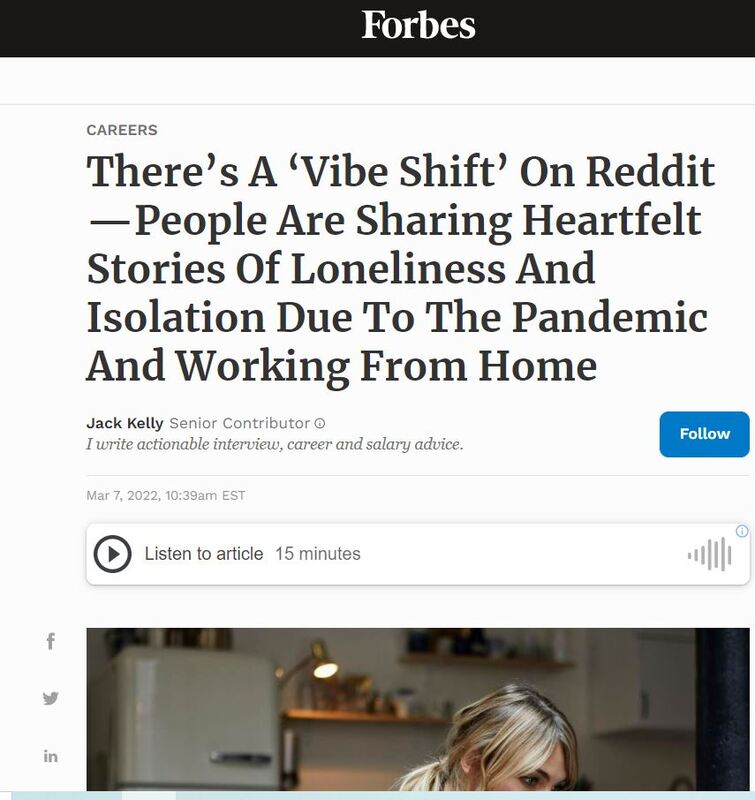 2022-03-07
2022-03-07There’s A ‘Vibe Shift’ On Reddit—People Are Sharing Heartfelt Stories Of Loneliness And Isolation Due To The Pandemic And Working From Home
This is a news story from Forbes by Jack Kelly. This story is about loneliness felt from isolation that people are discussing on Reddit. Subreddits like r/antiwork and r/wallstreetbets, a lot of these conversations are sharing details about their feelings they might not want to share elsewhere. Since Reddit allows people to submit anonymously, it gives others an environment they can give more details on subjects they maybe wouldn't tell to even their family members. Some of these discussions are about those that are single and work from home, which creates a very solitary experience. One woman, 27, on Reddit describes trying to join Facebook groups and do online dating to have more interaction during the pandemic. She says she felt a slight panic seeing her other friends get married, have kids, or engaged, which made her feel even lonelier. Others describe the challenges with finding remote work and needing support to help cope with that hardship. The lack of socialization has had massive effect on young adults just starting out in life, and it has given some worse mental health as a result. While some might thrive with being alone, others have suffered. Another woman, 32, says that prior to the pandemic, she was a 'social butterfly' and outgoing, but is now antisocial and a shut-in. She says that she lacks the motivation to go places like she used to. In addition to this, her place of employment is considering permanent work-from-home for employees, making some of those social struggles even worse. Some Redditors ended up giving advice for people that shared stories like these, such as smiling every day towards someone, or going outside for 15 minutes or longer. Simple things like this were common suggestions to help with some people's mental health issues induced because of the pandemic isolation. I think that this story helps show some of the negative effects young people have had with readjusting their entire lives, and then feeling lost once they get too used to it when things are starting to go back to "normal." -
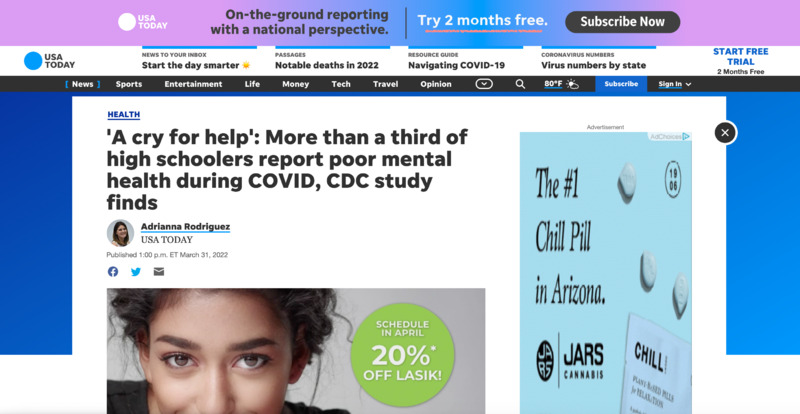 2022-03-31
2022-03-31'A Cry for Help': More than a Third of High Schoolers Report Poor Mental Health During COVID, CDC Study Finds
This is a story from USA Today by Adrianna Rodriguez. This is about the mental health in teens during the pandemic and how it has affected them. The CDC study that is cited says that 44% of high schoolers reported feeling persistently sad or helpless during 2021. Over half of the students surveyed were reported to have experienced emotional abuse from a parent, with 11% saying they have experienced physical abuse. Nearly 30% of students reported a parent or another adult in their house had lost a job. In a demographics breakdown, LGBT students reported more suicide attempts and poorer mental health than their counterparts. One third of students say that they have experienced racism. This article is meant to help show the impact COVID has had on people and the way lockdowns have impacted high schoolers specifically. -
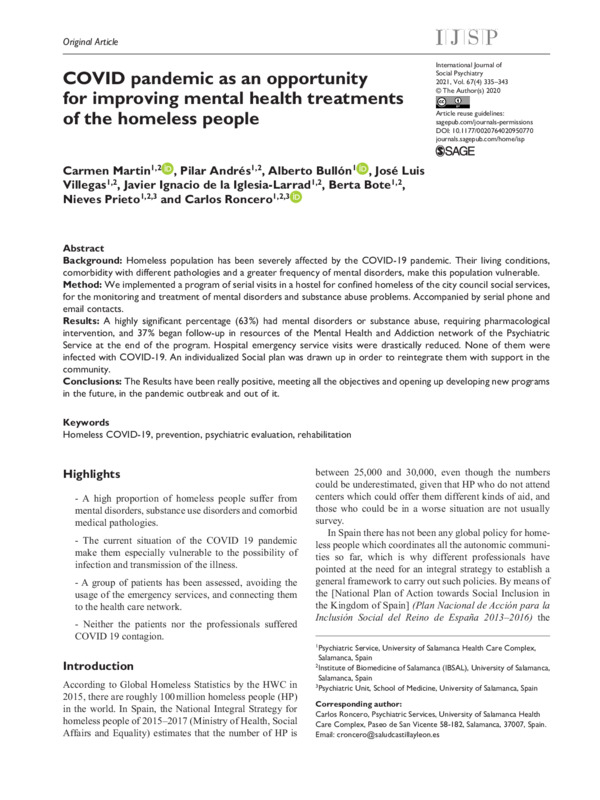 2021-06-27
2021-06-27Pandemic lockdown gives a new opportunity towards homeless mental health. A study from Spain
While the COVID-19 pandemic has drastically altered mental health, see https://covid-19archive.org/s/archive/page/mental-health, I hope that there could be benefits to mental health as COVID rates around the world drop. It is now more convenient than ever to partake in counseling services from the comfort of your room, especially if you have social anxiety or pandemic anxiety. Unfortunately, statistics are not out as of March 2022 that demonstrate that mental health is improving with waning COVID rates, instead counselors, psychiatrists, and psychologists seem busier than ever. While telehealth meetings are convenient, wait times and schedules are full of the backlog of people whose mental health was affected by the pandemic. I wanted to find an example of a positive outcome on mental health through COVID's global sweep, especially as COVID wanes. Attached is an example of a study in Spain that focused on a group of homeless in Spain that were in lockdown. "More than 60% of them presented mental disorders and within 8 weeks they were visited in person 2–3 times...Finally, 51.8% were linked to social and health care services and 37% to mental health resources, which can constitute a step forward in their reintegration and normalization." They argue that if it was not for COVID and these efforts, these homeless people may not have been diagnosed and helped. The paper concludes that this study is useful for the future because it shows how under immensely stressful situations, primary and secondary interventions worked. This can be repeated without a pandemic. While the pandemic was very stressful, it reaped some benefits such as a new focus on mental health, new methods of talking with trained professionals, and studied like this that show data of improving mental health in times of stress. -
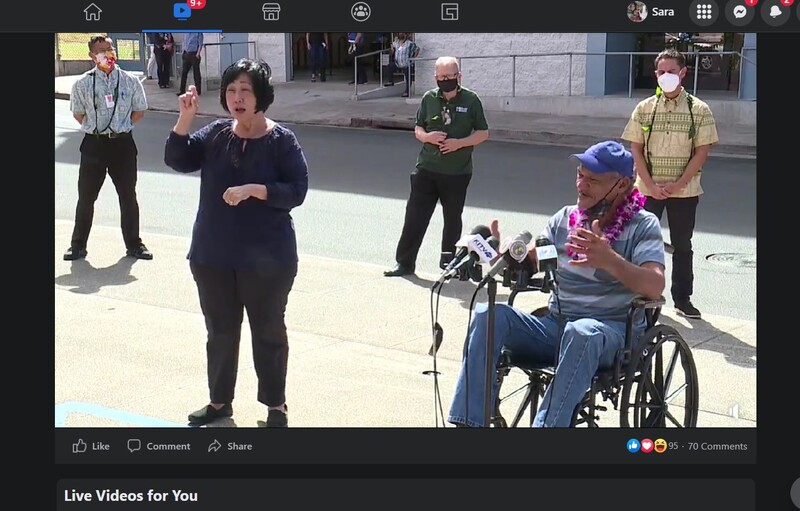 2020-11-17
2020-11-17Punawai Rest Stop For Homelessness
KHON2 News Story on the Punawai Facility. The facility aims to help the community combat homelessness and aid those experiencing homelessness bringing hope to everyone. -
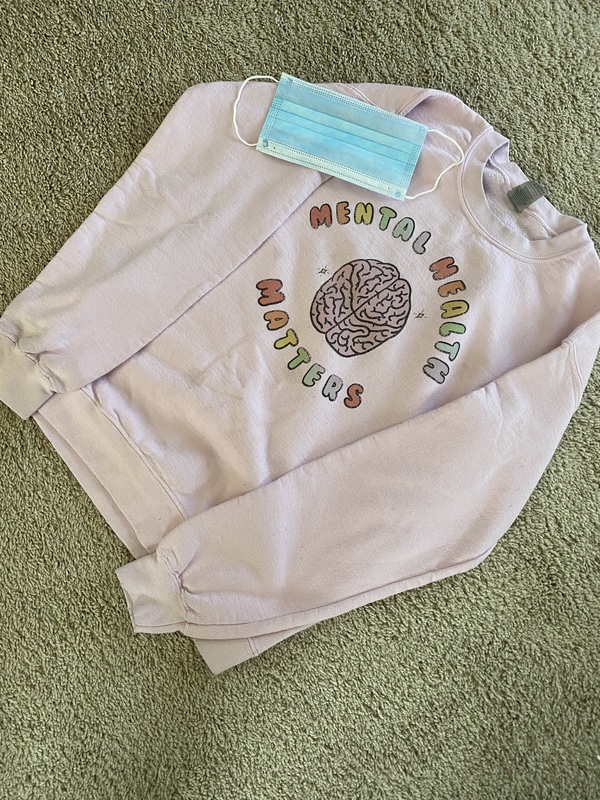 2022-03-26
2022-03-26Coping with the Pandemic--A Personal Look at Mental Health and COVID-19
According to the Center of Disease Control, in June of 2022, US adults reported considerably elevated adverse mental health conditions associated with COVID-19. Out of a survey they did on 5,412 people, 40.9 percent of respondents reported at least one adverse mental or behavioral health conditions, including symptoms of anxiety and depressive disorder which were around 31 percent. One of the causes of this is due to increase sedentary behaviors and low levels of physical activity due to quarantines and lack of business operation. Over the past two years, government mandated quarantine, work from home, and online schooling has caused me to stay at home for longer periods of time than what I use to. Because of this sedentary behavior, I had dealt with the negative effects of isolation, stress, and anxiety on both my mental and physical health. According to the World Health Organization, 150 minutes of moderate exercise or physical activity is usually recommended per week, however, with working a full-time job and being in school, the question that remains is how that is possible? I have learned to accommodate these physical needs indoors, by taking active breaks during the day and exercising at home. While this does not necessarily help with isolation and loneliness sometimes, I have learned to take these matters one day at a time and not shun myself for feelings them. CDC argues that from a recent comprehensive review that the impact of COVID-19 on mental health particularly seems to affect more young women disproportionally than any other group. Therefore, I recommend any young adult or women facing severe mental health to take advantage of online support or mental health services through telehealth such as ZocDoc. It is important to highlight COVID-19's impact on mental health in the United States and my personal life because it shows how the pandemic changed the means and the ways we received mental health services in the past. As the pandemic ventures on, people like myself will continue to have to find ways to cope and receive services for our problems. Thanks to the pandemic, much of our mental health problems have come more to the forefront due to us having ample amounts of time now to navigate and deal these issues unlike never before. -
2022-03-25
How COVID Changed my Marriage
I got married in May of 2019. When I got married, I had no idea something like COVID would happen and change the dynamics I had with my husband. COVID happened the first few months into our marriage. With it, my husband had to start working from home. I won't lie and say it wasn't an issue with my husband having to not be in the office anymore. I felt like I couldn't do as many things, as my husband had to talk to clients and go to meetings, where I couldn't be too loud. Another thing I wasn't used to at the beginning of all of this was seeing my husband far more often than just before or after work. With that, I had to learn to communicate better with any issues I had instead of bottling it up as much. As we were together more, I had to learn to accommodate for that. From reading news stories early in 2020, not everyone was able to make their marriages work, and ended up getting divorced after some spouses were made to work from home. I think that is one thing people aren't always aware of being an issue in a marriage. Sometimes too much time together can have the opposite effect, especially if communication was already shaky even before the pandemic. There were a few times I did get angry with my husband for not feeling like I was being understood. With him being at the apartment more, there were more opportunities for me to get annoyed with him. At some points though, the anger wasn't even really his fault, but my own for not dealing with the lockdowns well mentally in addition to forgetting to take medicine or do other tasks. I had to learn to speak more openly about these issues rather than letting them linger. Funnily enough, it wasn't until February of this year that we both really learned to talk to each other more productively. The big fight we had was partly from me feeling jealous of how my husband would talk to his friends more often than he would me, as for a while by that point, we had gotten into a routine during COVID of both of us being on our phones way more than we should be. We later had to come to the agreement to set aside specific time for each other without using our phones. It has already been over a month since that change, and the relationship has improved drastically. Some of my habits that I made to help cope with COVID and general anxiety issues kept me from having as solid a relationship with my husband. Intimacy was another issue that came up due to my husband working from home. Even though we physically saw each other more often, we didn't kiss nearly as much as we used to. I think that sometimes kissing goes to the wayside if people become too busy. This was something we ended up having multiple discussions on, as we wanted to show more affection with each other, but did not think to do it. Overall, the biggest changes that happened in my relationship with my husband because of COVID was the way we communicated. Being together in person more often meant we had to work through multiple issues we had prior to COVID or because of COVID. Being alone together more often may seem like an ideal situation to some people looking from the outside, but with it can bring a host of new issues. Some people during the pandemic learned this the hard way and ended up getting divorced. The problems me and my husband have had were not unsolvable, but they take some maturity to work through without it causing resentment. I think sometimes of what it would have been like if COVID never happened early on into our marriage, and now I am glad some of it did, because I have become a better wife and am able to meet my husband's needs better than before. Life really did hand me one very tart lemon by having to deal with a pandemic the first few years in marriage, which many say are some of the most vulnerable years for a couple. That tart lemon has since been made sweet, but only because both of us were able to recognize problems and figure out ways to help each other. -
2022-03-24
High Functioning Autism during a Pandemic
For those that are somewhat familiar with autism, one might believe the pandemic was perfect for someone like me. People were encouraged not to speak to each other in person, everyone had to keep a distance, and masks were everywhere to conceal the face. These things, for me, were what I dreaded. I had a pretty good routine going before the pandemic. I had just graduated college with my bachelor degree and was getting used to being married. I was also caring for my grandma as one of my first jobs. I got to get up every morning, earn money, and make sure my husband was well cared for. My husband and I would go places for date nights and we would sometimes do spontaneous things like midnight grocery shopping for ice cream. Things were just carefree. Then a few months into our marriage, things changed a lot (more for me than for my husband). I enjoyed going to church in person for both my spiritual needs and for the social aspects it gave me. Once March 2020 happened, I couldn't go to church in person. Church was online and it became harder for me to get into it and actually concentrate. I then just stopped going altogether for a while because I wanted to have that human connection I was missing. Eventually, I was able to go to church again, but I had to wear a mask. I dealt with it even though I didn't like it. It was sad to see so many people's faces covered by cloth. It made it feel like I couldn't connect to people as well. My social skills aren't terrible if everyone wears a mask, but I'm more likely to miss certain cues or tell when someone is joking. I focus on the mouth a lot when people talk, so not getting to see mouths was bothersome. Other elements of my life changed, and autism made it worse for me in some ways. Due to my older habits of wanting to go places more often, the stay-at-home orders that occurred at the very beginning made me feel like a prisoner and that I couldn't choose things for myself as often. This increased my anxiety a lot, to a point of a mental breakdown. My husband was luckily very understanding of my issues, so I was eventually able to recover once I gave myself more work to occupy my time with. Of all the COVID rules I had to follow, social distancing was one of the easiest things for me, but only in a few ways. I was fine with talking in person from a distance, as I already do that naturally, but I was not okay with having to talk to people more often through online video like Zoom. Zoom feels so unnatural because seeing people through video is not the same as seeing them in person. I didn't have to do it very often, but I was greatly unhappy at the annual family Christmas celebration in 2020 was all on Zoom. It didn't feel as festive as I would have wished. Autism in general has made COVID much harder to deal with, and sometimes I think that if I didn't have it that I could have adjusted better to the abrupt changes COVID brought into my life. I did learn some things though. I learned that I need a set routine to get things done, and that if I have a problem, I shouldn't feel afraid to be more honest about it. With my husband having had to work from home due to COVID, both of us have had to work on better communication skills. I don't think everything I've learned from this experience has been bad, but it's also not something I want to go through again. -
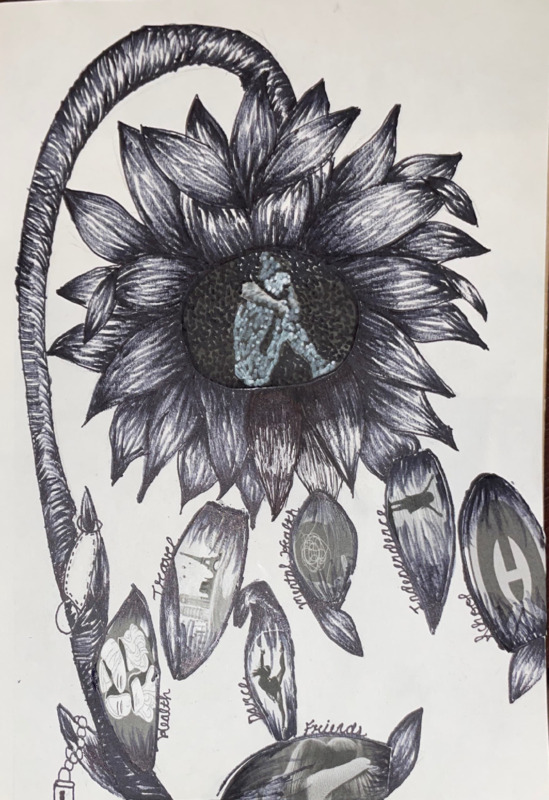 2022-02-25
2022-02-25The Fall of Covid
This flower represents the growth I have attained and hope. While the petals represent the things I felt like I lost during Covid. I think it is important for people to see how Covid affected everyone. This may open their eyes or give them something to relate to. -
2020-04
Blessing in Disguise
2020 started out great. I finally started to like my experience as a freshman at Duquesne. I really took a liking to my classes and the sorority that I joined, and I was always busy which was a nice change of pace from the fall semester. With this, I met a lot of amazing people who soon would become my closest friends. I was having a great start to the year. However, that all came to a pause in the middle of March. What I thought was going to be a 2-week vacation turned out to be a complete change in the way we live our lives. Zoom University was a nice break but it soon turned into a nightmare. I myself am a home-body, but getting up every single day knowing that I was about to have the same exact day as the next and the next was really hard. I had a really hard time not seeing family, friends, maintaining relationships, and just trying to stay sane during this quarantine. While this seemed like a never-ending cycle that would soon drive me and everyone in my house insane, it turned out to be a blessing in disguise. While I really loved my life at school, I realized that I didn’t have much time to focus on myself. It was just one distraction after the next. I finally got to really do things for myself. I made it a habit to workout inside the house, go on daily walks with my family, journal my thoughts, and really work on finding my inner peace. During this time, I realized that some things I had in my life pre-covid that I thought were serving me and bringing value, were not. Covid really stripped down every distraction and made it clear what was making me happy and what wasn’t, and for that I am grateful. Although it came with many struggles, covid taught a lesson to myself and I think to a lot of people of how to adapt well to a situation and focus on what is important, your well-being and the well-being of those closest to you and get back to your roots! -
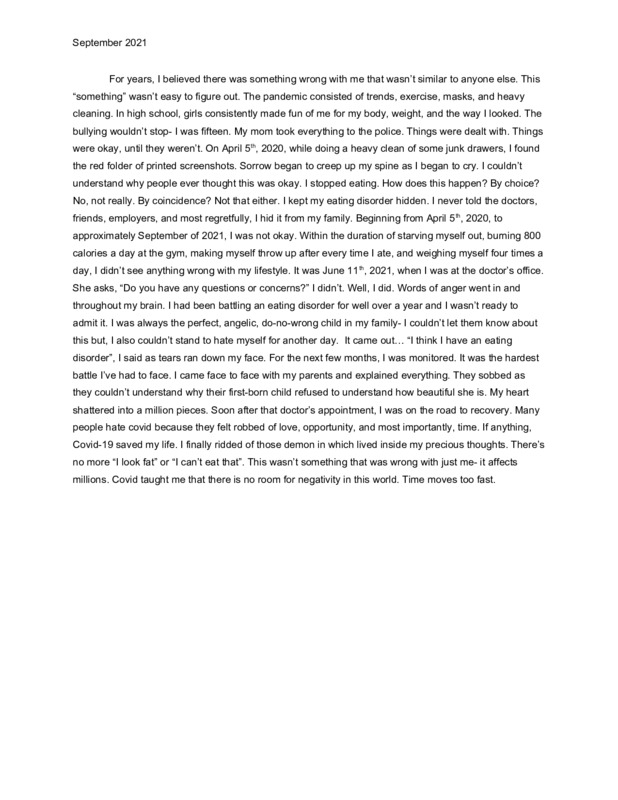 2021-09-13
2021-09-13Mental Health in the Eyes of a Pandemic
For years, I believed there was something wrong with me that wasn’t similar to anyone else. This “something” wasn’t easy to figure out. The pandemic consisted of trends, exercise, masks, and heavy cleaning. In high school, girls consistently made fun of me for my body, weight, and the way I looked. The bullying wouldn’t stop- I was fifteen. My mom took everything to the police. Things were dealt with. Things were okay, until they weren’t. On April 5th, 2020, while doing a heavy clean of some junk drawers, I found the red folder of printed screenshots. Sorrow began to creep up my spine as I began to cry. I couldn’t understand why people ever thought this was okay. I stopped eating. How does this happen? By choice? No, not really. By coincidence? Not that either. I kept my eating disorder hidden. I never told the doctors, friends, employers, and most regretfully, I hid it from my family. Beginning from April 5th, 2020, to approximately September of 2021, I was not okay. Within the duration of starving myself out, burning 800 calories a day at the gym, making myself throw up after every time I ate, and weighing myself four times a day, I didn’t see anything wrong with my lifestyle. It was June 11th, 2021, when I was at the doctor’s office. She asks, “Do you have any questions or concerns?” I didn’t. Well, I did. Words of anger went in and throughout my brain. I had been battling an eating disorder for well over a year and I wasn’t ready to admit it. I was always the perfect, angelic, do-no-wrong child in my family- I couldn’t let them know about this but, I also couldn’t stand to hate myself for another day. It came out… “I think I have an eating disorder”, I said as tears ran down my face. For the next few months, I was monitored. It was the hardest battle I’ve had to face. I came face to face with my parents and explained everything. They sobbed as they couldn’t understand why their first-born child refused to understand how beautiful she is. My heart shattered into a million pieces. Soon after that doctor’s appointment, I was on the road to recovery. Many people hate covid because they felt robbed of love, opportunity, and most importantly, time. If anything, Covid-19 saved my life. I finally ridded of those demon in which lived inside my precious thoughts. There’s no more “I look fat” or “I can’t eat that”. This wasn’t something that was wrong with just me- it affects millions. Covid taught me that there is no room for negativity in this world. Time moves too fast. The presence of eating disorders during the pandemic can help historians understand the impact of cyberbullying, food scarcity due to supply chain issues, etc. I don’t believe that researchers realize how many adults and children were affected by mental illness due to persistent lockdowns, isolation periods, restricted visitation, and new introductions to a virtual society. My experience offers intel to how mental and physical illnesses were underestimated throughout the entirety of the pandemic. Whether it be an eating disorder or a cancer patient, it’s difficult to watch because it seems like covid-19 patients are prioritized everywhere even if they choose not to be vaccinated. It’s a hard thing to watch in terms of priority because cancer patients, heart disease patients, etc. have less room in hospitals because people choose to not be vaccinated. With that being said, being vaccinated has no 100% guarantee of not being hospitalized but it lowers the rates substantially. -
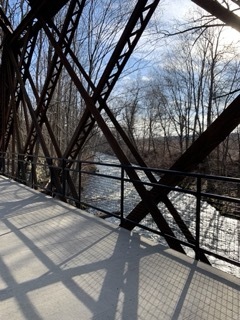 2020-03-01
2020-03-01The Hardest Year Yet.
March 2020 A week before the world shut down, I was enjoying spring break in the Bahamas still joking about covid 19. By the next Friday, I was preparing for the worst year of my life, and I did not know it yet. In two weeks, I lost the rest of senior year, prom, graduation, my stepmom was diagnosed with a rare autoimmune disorder which made it impossible to visit my dad, faced the fear of my mom working with covid every day despite having an autoimmune disorder herself. I could have never predicted that my entire life would fall apart so quickly. I was mad that I ever took it for granted. I dreamed my entire life what my graduation night would look like, and I never pictured graduating in our local drive-in movie theater. I carried the guilt every day of not wanting to go out or choosing to do something else instead of seeing my dad. I wished I could go back and take any opportunity given to me. At this point, I still had hope that the nightmare would end by Easter of that year, but it seemed like it would go on forever. I was scared. I was scared that my mom would catch covid and not be able to fight it. I was scared my stepmom would not get better. Everything was so unknown I found myself fearing the future. I spent months doing absolutely nothing every single day. I was so upset I could not even bring myself to get out of bed to eat. All I wanted to do was sleep. I could not get more bad news if I was asleep. Every morning I woke up I felt like there was just more bad news and I honestly did not want to know what it was anymore. Waking up every day to more life-altering news with no end in sight was exhausting. I now believe that this has forever changed my life in both ways. I do not take things for granted anymore because I quickly learned how quickly they can be taken away. I have learned to always look for the light at the end of the tunnel because even if it feels like it will never end it will. The most important thing I learned was that life is like a wave, there are highs and lows, but you need to learn how to rise again. I have included a picture of the walking trail in my area. This trail was an escape from the scares of the world. I would often take long walks on this trail to calm the anxieties of the future. It was a chance to leave the house and almost forget what was happening in the world. -
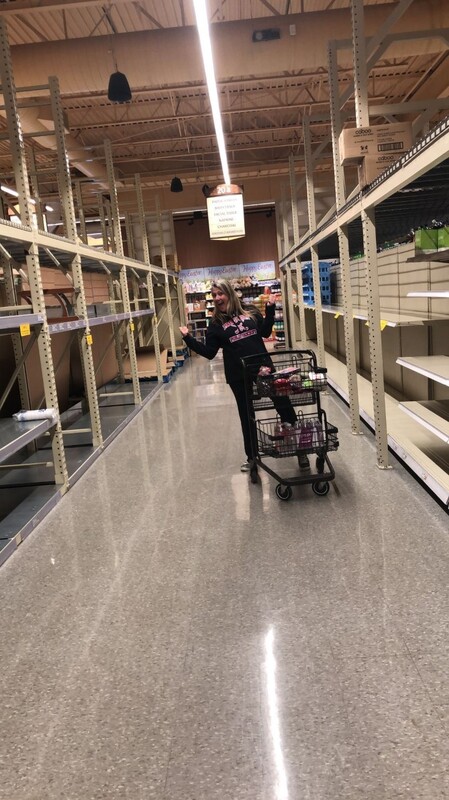 2022-02-05
2022-02-05The Bittersweet Impact of the Pandemic
March 13, 2020 was my last day as a student at Fairport High School in Rochester, NY, although I didn’t know it yet. I remember that day at school being filled with joking remarks, especially “Happy last day of school!” We discussed whether or not we thought school would close in economics class, and if it did, we came to the conclusion that it would only be a couple of weeks. The next day, I was in the car with my mom when I heard that school was to be closed indefinitely and that my dance studio, which I had been dancing at since I was three, also canceled classes. I started crying and got mad at myself that I took all those moments in the halls and with my teachers and friends for granted, as well as dance competitions and practice. But, I calmed myself down by reassuring myself that it would only be a couple weeks. My mom and I then went to Wegmans to see how empty the aisles were, and I was surprised to find that the cheese aisle was basically empty, and that there was no more toilet paper nor paper towels available. It’s weird looking back on how we weren’t wearing masks yet. The two weeks turned into months and on May 1st, school and dance stated that they were closed for the remainder of the year. I missed out on ball, my last dance competitions, my last dance recital, senior bash, and my graduation. We graduated by watching a poorly put-together slideshow of everyone’s pictures and pre-recorded speeches. Teachers came by and handed us our diplomas. We all drove by the dance studio the day that recital was supposed to be. However, despite these setbacks, I was able to learn more about myself and become closer to my family. My life that was previously extremely busy was put on pause, and sometimes I miss that. I started to paint, I watched a ton of movies that I had always wanted to see, I had time to spend with my dogs and cat, I got closer with my siblings, and I started to become an activist after the death of George Floyd and educate myself on racial inequalities and police brutality. The scariest part of quarantine was when my mother was redeployed to the COVID unit at RGH. She was only there for a couple weeks, but she saw how hectic and scary COVID truly was. She saw people die and not be able to say goodbye to their loved ones. Whenever she returned from work, I would have the front door propped open and the shower running so she could just jump right in the shower, and then I would spray everything with Lysol. Although I became majorly depressed in September of 2020 and I still dwell on the moments that I have missed, the pandemic was able to put my priorities into perspective. The pandemic was able to teach me not to take things for granted, to pay attention to the world around me, to try to make a difference in the world, and to make more time for the things and people that I love. May all those who have passed from COVID rest in peace and my heart goes out to all those impacted. -
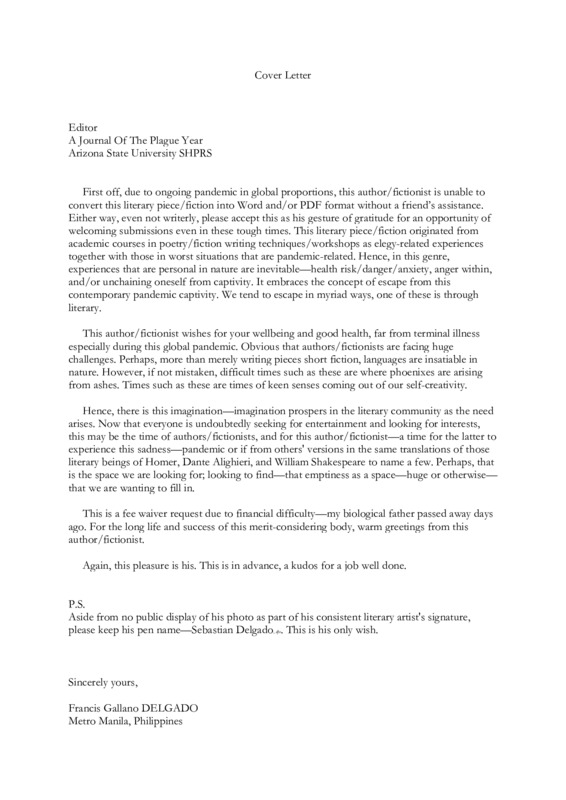 2021-12-05
2021-12-05Five Pandemic 2021 Edition by Sebastian Delgado, dps
-
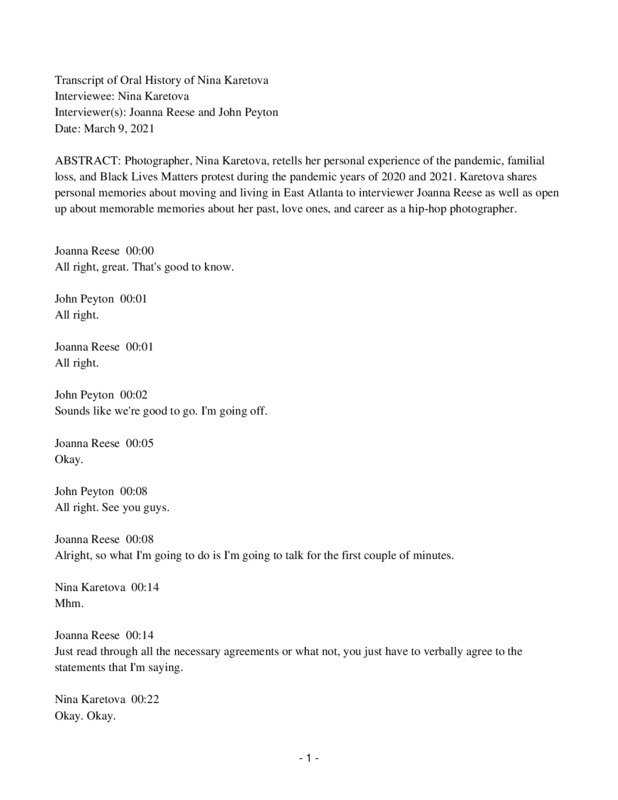 05/02/2021
05/02/2021Nina Karetova Oral History, 2021/03/09
Indiana University advocate, Joanna Reese interviews Atlanta photographer, Nina Karetova. -
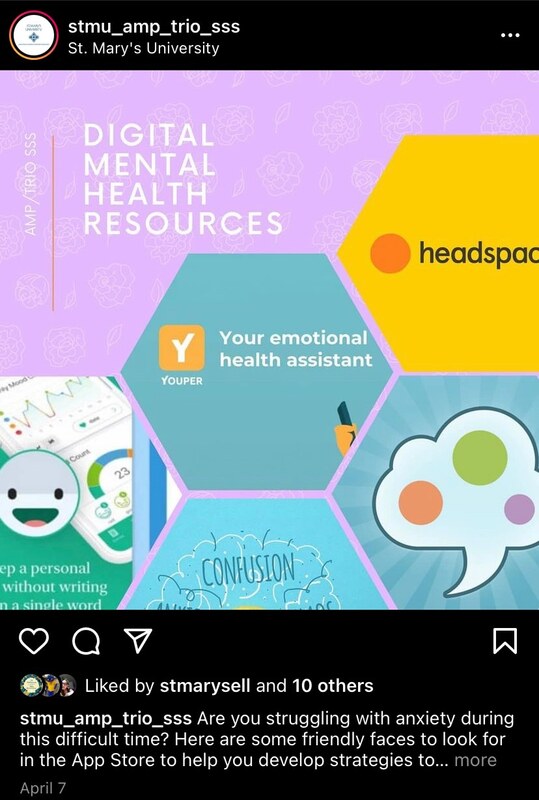 2021-04-07
2021-04-07The Mental Pandemic
The pandemic was difficult in more ways than one. Health and safety were covered by all news stations, but the deeper hidden pandemic was the struggle of mental health and staying mentally healthy during isolation and lockdown. These screenshots showcase that mental health was an important topic that people were struggling with but the university tried to give help to students and staff that were struggling. This screenshot is important to me because they were resources I utilized that helped me mentally go through the pandemic and I believe deserve more attention. -
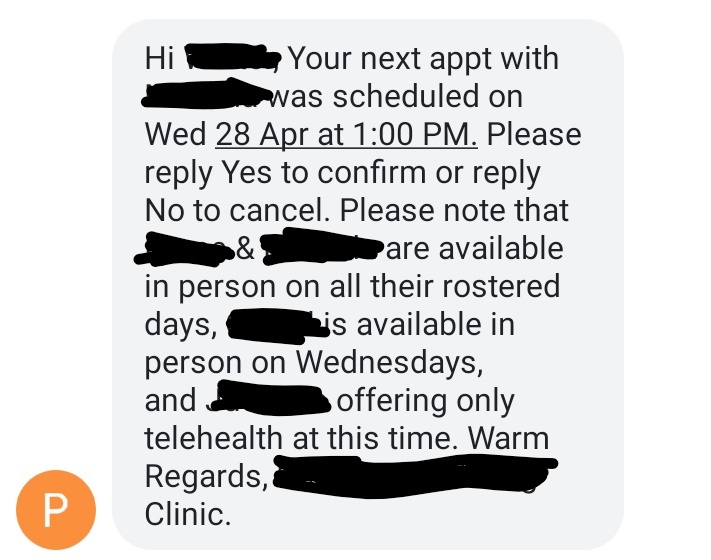 2021-04-03
2021-04-03HIST30060: Mental Health Appointment
Here is a screenshot of a medical appointment reminder for a psychologist in regional Victoria. I had been seeing this psychologist for a few years at this point, however, during the pandemic only telehealth or phonecall appointments were available. These were stressful experiences to conduct these online and finding a safe, quiet space in my house was difficult. That being said, I was lucky to have a psychologist during this period, as I know that many people were not able to recieve adequate care due to the influx of necessity. I chose this appointment reminder specifically as it occurred during the brief reprieve from lockdown early in 2021. It shows how certain health providers (their names have been blacked out for anonymity) have their own unique requirements that must be followed. -
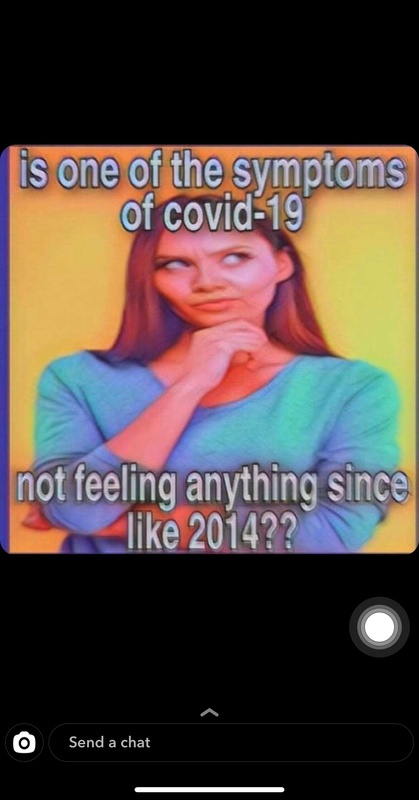 2020-03-24
2020-03-24Symptoms on the Youth
When the pandemic first broke out out, many people didn't know what to think. In millennial and gen z fashion, many young adults turned to the internet to crack jokes and voice their opinion about the upcoming crisis. This meme pokes fun at the uncertainty of the viruses' signs and symptoms many medical and governmental officials had at the beginning of the pandemic. The mem also pokes fun at the idea of teenage angst and anxiety a rapid number of young adults are starting experience more and more during this recent decade. The pandemic may cause your nose and mouth to not feel anything but the real question is if young adults are really "feeling" the impact of what is going on? A Forbes report in April of this year has indicated that young people between the ages of 18-24 are starting suffer from more mental health problems than any age group since the pandemic started. Think what you will but this study definitely proves that more young adults will suffer long lasting effects of pandemic during and after the global crisis comes to a end. I liked this meme because it a representations of some of my numbs feelings I have had during this pandemic. -
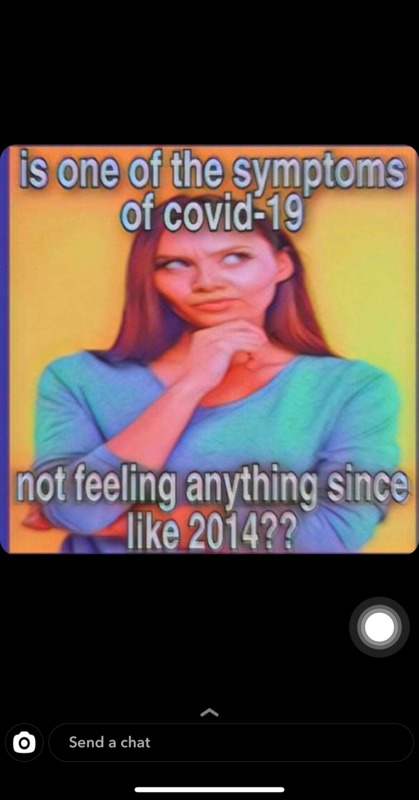 2020-03-24
2020-03-24Feeling Again
When the pandemic first broke out out, many people didn't know what to think. In millennial and gen z fashion, many young adults turned to the internet to crack jokes and voice their opinion about the upcoming crisis. This meme pokes fun at the uncertainty of the viruses' signs and symptoms many medical and governmental officials had at the beginning of the pandemic. The mem also pokes fun at the idea of teenage angst and anxiety a rapid number of young adults are starting experience more and more during this recent decade. The pandemic may cause your nose and mouth to not feel anything but the real question is if young adults are really "feeling" the impact of what is going on? A Forbes report in April of this year has indicated that young people between the ages of 18-24 are starting suffer from more mental health problems than any age group since the pandemic started. Think what you will but this study definitely proves that more young adults will suffer long lasting effects of pandemic during and after the global crisis comes to a end. -
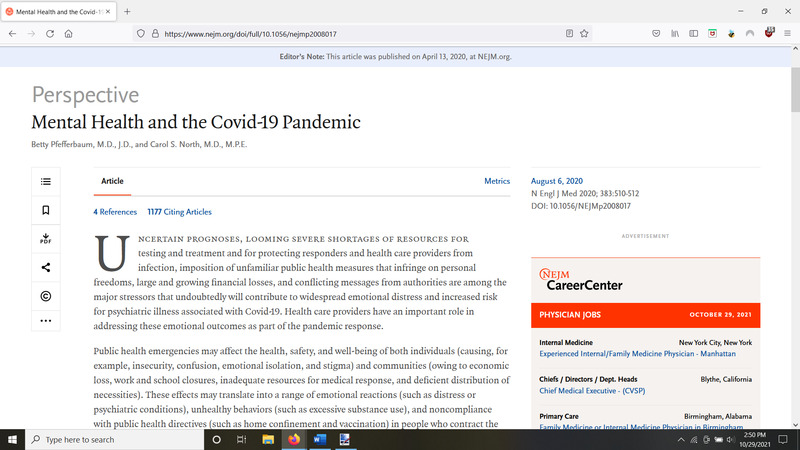 2020-04-13
2020-04-13Mental Health and the Covid-19 Pandemic
Uncertain prognoses, looming severe shortages of resources for testing and treatment and for protecting responders and health care providers from infection, imposition of unfamiliar public health measures that infringe on personal freedoms, large and growing financial losses, and conflicting messages from authorities are among the major stressors that undoubtedly will contribute to widespread emotional distress and increased risk for psychiatric illness associated with Covid-19. Health care providers have an important role in addressing these emotional outcomes as part of the pandemic response. -
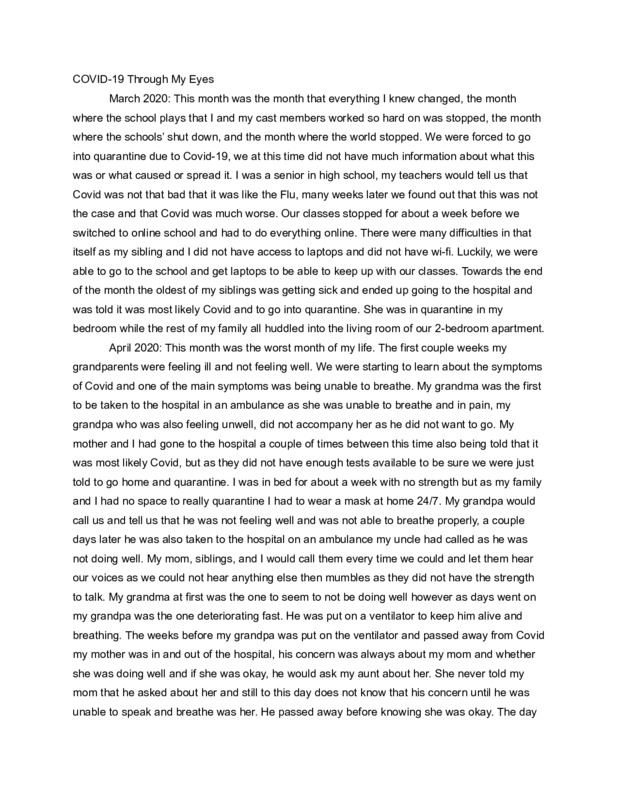 2020-04-01
2020-04-01COVID-19 Through My Eyes
This story is about my experience with Covid-19 and how my family and I endured the hardships we faced and everything we have gone through in the past years. This is important to me because it shares about the struggles we went through and shows what we experienced through what i consider to be the worst moments of my life. -
2021-08-14
Beware a Pandemic
As we approached our second year of the Covid-19 pandemic things like mask and disinfecting door knobs just became a norm to me. Unconciously, I wouldn't think of Covid-19 as the virus Id just live life with the existence of COVID. I am known for my obsession of believing a single cough could mean I'm at a near death so mentally I was just exhausted. After some time I began to worry about my two year old daughter, she was starting school at a special needs program which I could not wait for. I knew my daughter's progression was one of my top priorities but what about her health and well being? I couldn't help but think "What if there is COVID in the school?" I kept my company very small as I lived alone with my daughter. The only time we were exposed to other people was when she visited her dad on the weekends, but he too was very cautious. A week into my daughters schooling I finally stoped worrying and celebrated my cousin's birthday with her. A day later my cousin had called me with the news that she was COVID positive. My mind raced as I graphically remembered my daughter sharing a bite of a burger with my cousin, it was almost no doubt in my head that we were infected. I got both of us tested that very day and we were negative but I had knowledge on this infection I still held my breath as I knew I had to retest in two to three days. After three days when I planned to get tested I woke up with soreness in my eyes and a headache, I explained my pain to my boyfriend and he had said that he felt that pain too. Minutes after I got tested and I was positive my daughter was already at her dads house so I told everyone to get tested and everyone else was fine. Two weeks, fourteen days in quarantine drove me mad. I suffer from depression and something about being completely alone triggered me. I could not eat my symptoms continued to change. I lost my taste and my sense of smell. I couldn't walk or stand for too long but honestly my common cold from a month back felt worst than this. The mental and emotional aspect of this situation is what really hurt me. I was so alone and worried I missed my child and her dad had to take off work for a week. I barely had any money and I just felt like I couldn't reach any type of human interaction even with my electronics it wasn't the same. On my tenth day of COVID I went to retest and I was negative. The after mass of Covid took a toll on me. I lost 16 pounds and I already had issues with my weight personally. My stomach felt faint and empty for weeks after the virus was gone and I felt like I did not want to go anywhere. I decided to still quarantine for the full fourteen days just to be safe and rest. My daughter's school (which she wasn't attending due to not being home) called and said someone tested positive and that school would be closed for two weeks. My mom whom I haven't seen in weeks also called on the tenth day to tell me that she had a fever and went to get tested, another positive. I felt trapped almost as if I couldn't breathe. Getting back into the real world without seeming like a hypochondriac was so tough but just like the virus things change and I was over my anxiety. All that's left now is to worry about the long term effects... Who knows what the future might hold. -
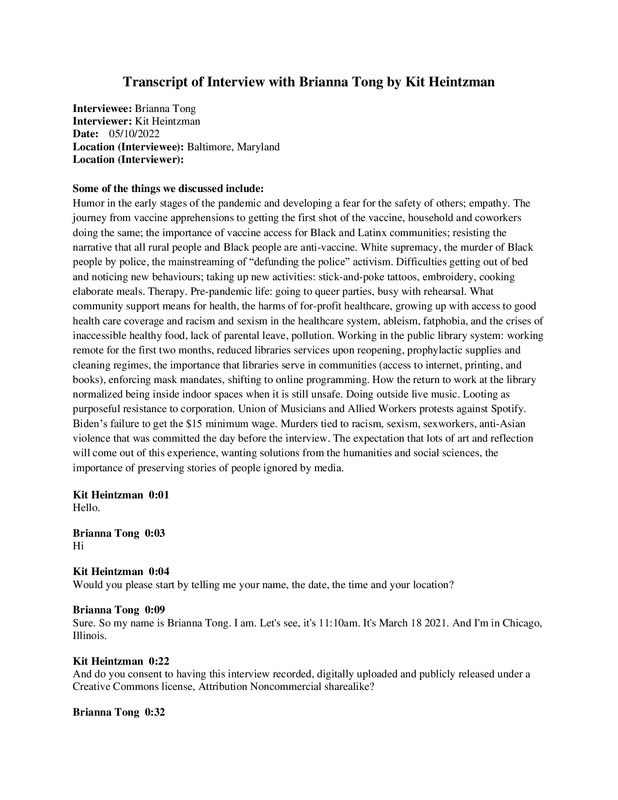 2021-03-18
2021-03-18Brianna Tong Oral History, 2021/03/18
Self description: “I am sitting in my bed right now as I’ve done for a lot of this quarantine. In regular times and I guess still now, I’m in three bands and I also work at the library, the public library. So I’ve been working there in person since we came back to work in May. I was contacted for this interview through Bussy Kween Power Trip, which is a Black queer punk band with three people, no guitars, so my close friends. I’m in two other bands. One band is called Je’raf and one is called Cordoba. And one person each from Bussy Kween is in each of those bands. Haven’t played a show in forever. I can give a little about what I look like or am like. I’m a woman. I’m 26, almost 27 I guess. I’m Black and Asian. I’m kinda short. And during this pandemic I’ve been in general super lucky to have a job still and a great living situation. And I met my partner right before the pandemic, so we’ve been chilling a lot and that’s been amazing. She is so great. Yeah, just going to work and working on all kinds of things in my home. And sometimes having the energy to do a bunch of music and crafts and other art things, and sometimes laying in bed for a full day.” -
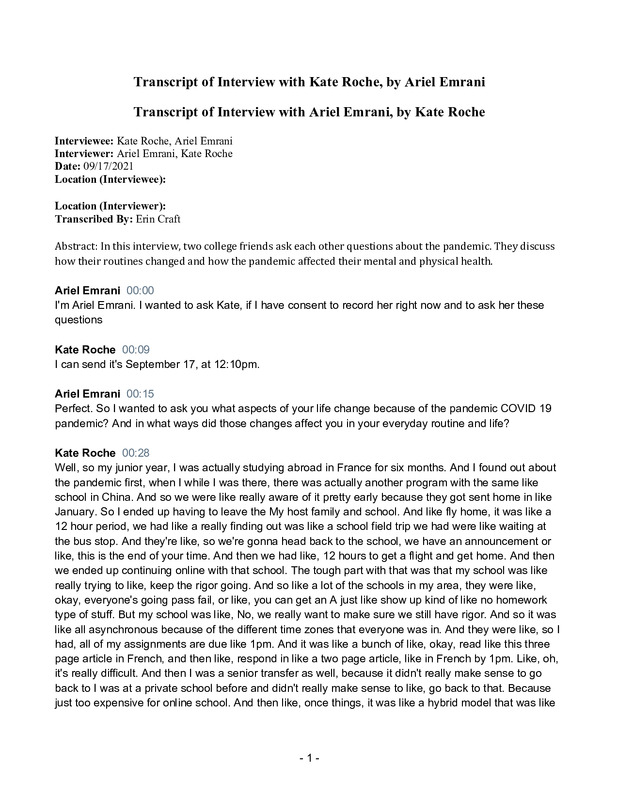 2021-09-17
2021-09-17Ariel Emrani and Kate Roche Oral History, 2021/09/17
This audio file shares two perspectives and personal stories about the pandemic. -
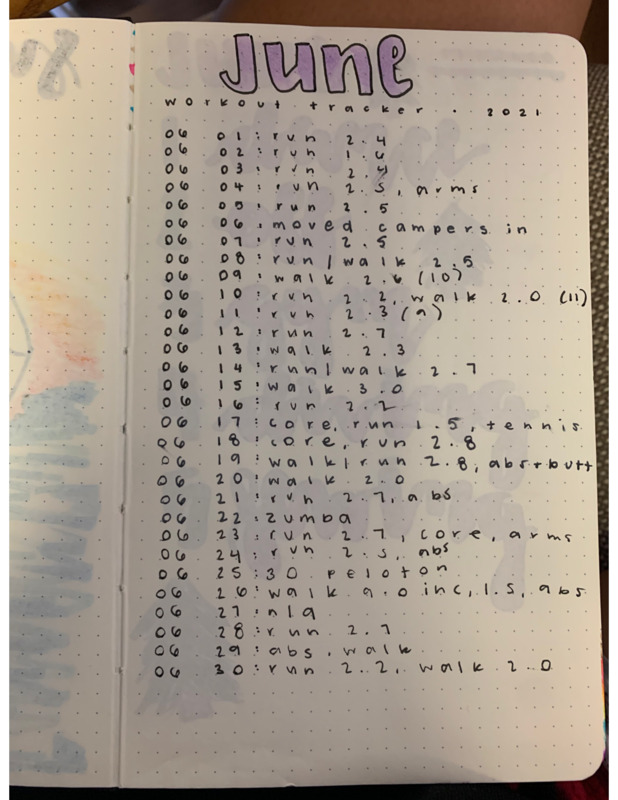 2021-06
2021-06Lasting pandemic effects of overexercising
This page from my bullet journal displays the workout I conducted each day during the month of June, 2021. The viewer should note three pertinent pieces of information to understand the necessity of this piece for the archive: the bullet journal itself, the exercise habits, and the timeline between the beginning of the pandemic to the actual entry. Primarily, I picked up the hobby of bullet journaling itself during March of 2020. I wanted a method to record my own habits – such as exercise, eating, music taste, and TV shows - in a scrapbook type format during the pandemic. Truthfully, the entire book would contribute to the archive, due to the personal detail and day-to-day routine recorded. Secondly, the workout tracker shows a slight addiction to exercise, with runs or walks every day, in addition to tens of thousands of steps I already took. These overexercising habits began for me during quarantine, with time and stress on my hands, and no healthy ways of coping. Finally, the reader should also acknowledge that I wrote this entry in June of 2021, a full 15 months after the start of lockdown in the US. That timeline shows that lingering effects of the pandemic remain, perhaps even grow with time. This artifact expresses more about my experience with the pandemic than I can articulate due to one central reason: learning self-love through exercise. Though I’d always struggled with having time on my hands, the pandemic left me feeling more uneasy with loneliness and boredom. Without a healthy way to deal with my emotions, I turned to exercise for the release and endorphins that I needed. Before I knew it, a casual workout each day led to apple watch addiction, calorie counting obsession, and cycles of binge eating and overcompensating through exercise, etc. While this sounds like my own personal journey, quarantine kickstarted and exacerbated these issues for adolescents all over the nation. With the recent introduction of tiktok “What I eat in a day” videos and Chloe Ting’s workout videos, people grew obsessive about wellness and moving their bodies. I learned so much about my body and my brain through this struggle with overexercise and obsession – and I feel grateful for that. Still though, I notice these effects in myself and others. This small contribution of a workout tracker speaks volumes about habits of teenagers after months of loneliness and free time – whether teenagers obtained an obsession with appearance, food, or exercising. And if those issues did not resurrect for some, I’d argue that the pandemic brought many other mental health challenges to surface for my age group. While this submission does little to express my emotions or challenges surrounding my exercise routine, it conveys the lingering effects of mental health tolls and body challenges from the pandemic. -
 2020-03-01
2020-03-01Increase of Outdoor Participants since the Pandemic's Onset
Since the start of the pandemic, I've begun to both run and hike when I get the chance. After talking with people who have done the same since before the pandemic, they've noted how there is absolutely an increase of people outdoors. For me, it's a great way to escape and improve mental health, and I think it's worth noting how many are trying to find ways to improve themselves and keep going through various ways during such a tough time. -
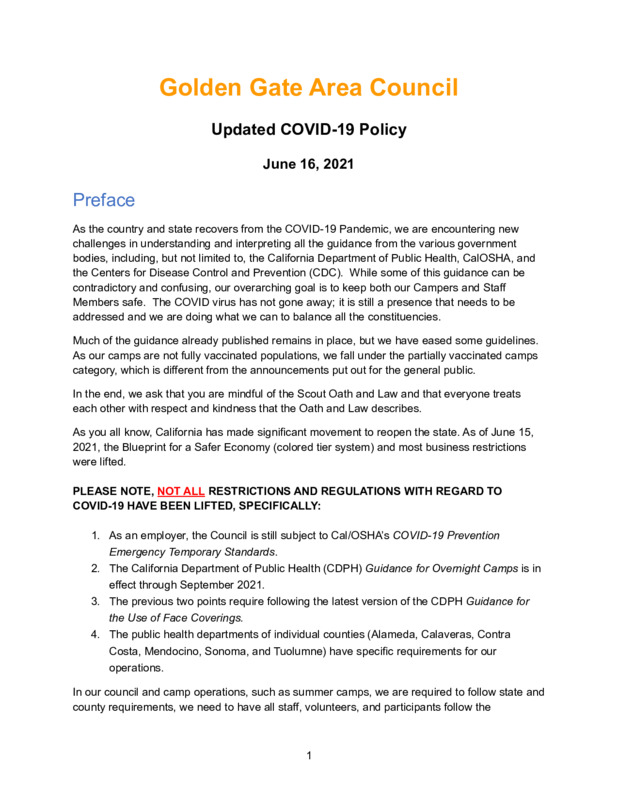 2021-06-16
2021-06-16Golden Gate Area Council Updated COVID-19 Policy
This is a document made by Golden Gate Area Council in response to California's reopening on June 15, 2021. It discusses vaccination and testing status requirements for campers, masking requirements indoors, tenting, and dining service, all of which are mentioned in the Leader's Guide. The end of the document implores leaders to make sure their Scouts clean themselves at camp, and concerns about mental health that arise from Scouts not staying long periods of time away from home for over a year. Neither hygiene nor mental health is mentioned in the Leader's Guide, but both are mentioned here. The document softens some of the COVID restrictions that were planned for camp. The update states that dining halls will be open for normal dine-in meals, overriding the Leader's Guide which stated that some meals may be take-out. Additionally, the update specifies that masks are not required to be worn outdoors. The Leader's Guide said "while at camp each and every camper must wear a face covering over their mouth and nose", not addressing a difference between indoors and outdoors. -
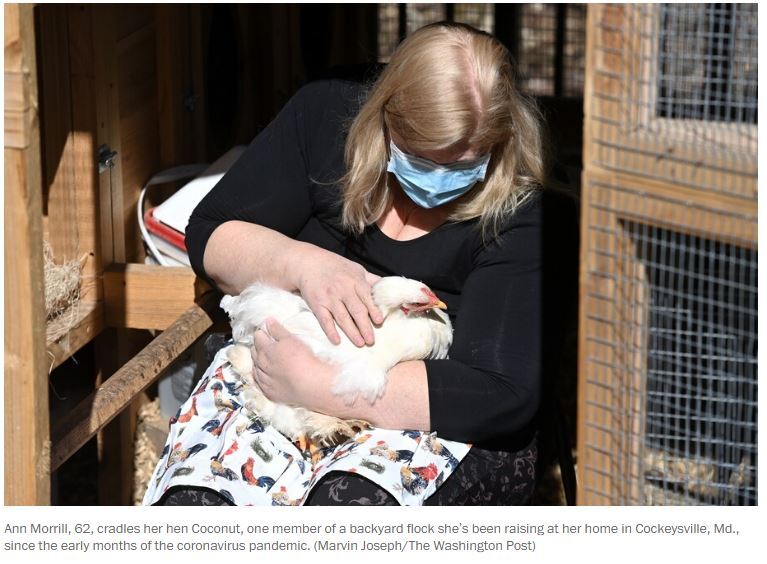 2021-03-29
2021-03-29Her pet chickens were a source of emotional support during the pandemic. Then, the predators came.
Though research in this area is often qualitative and findings have at times been disputed, studies suggest that interacting and forming bonds with animals, such as dogs, might have a positive effect on a person’s well-being. During the past year, in particular, many people have reported that pets played an important role in helping them cope with the physical and psychological tolls of pandemic life. Animals provide companionship and can offer unconditional affection, which people don’t always get from other humans, said Lori Kogan, chair of the Human-Animal Interaction Section of the American Psychological Association and a professor at Colorado State University. Owning pets can also help people maintain a schedule and feel a sense of responsibility, Kogan said. Although existing research has largely focused on more traditional pets, she said, “raising chickens can provide an incredible amount of emotional support.” Plus: “Chickens have their own little personalities. They’re very funny. They’re very cute.” For Kelly Rutkowski, 38, of Ashland, Va., her chickens are her “therapy.” “Just going out with them and just caring for them, interacting with them, it makes me happy,” said Rutkowski, founder of the Adopt a Bird Network, a nonprofit organization dedicated to raising awareness of adoptable birds in animal shelters and rescues nationwide. In addition to hens, Rutkowski also keeps a “bachelor flock” of roosters. “I know we’re missing out on being able to go out and do things and stuff, but being with the chickens is just an experience which makes it easier,” she said. “I’d say they’re just as fulfilling as a dog or cat.” -
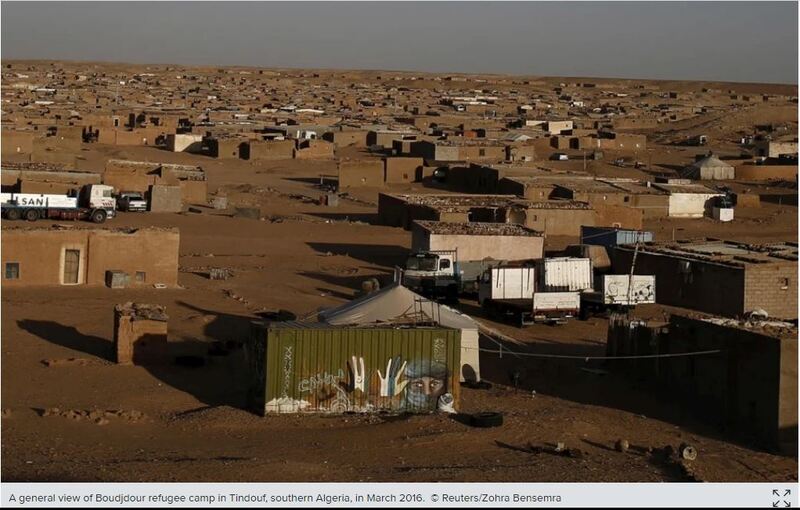 2020-09-01
2020-09-01Sahrawi refugees in COVID-19 lockdown hit by livestock epidemic
Refugees from Western Sahara in camps in Algeria’s Tindouf province lose animals to livestock epidemic, while coronavirus restrictions wipe out other means of income. -
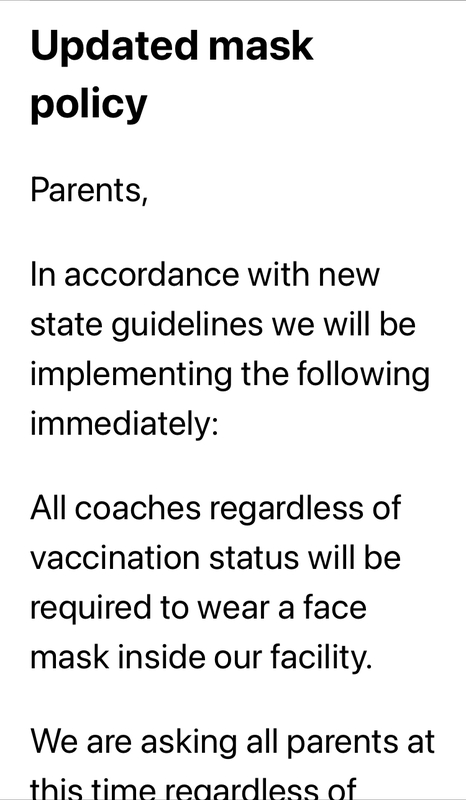 2021-08-11
2021-08-11There is No Good Decision
My daughter is very athletic. I don’t make that statement lightly. I do not lie and I will look you in the eye and tell you my son is not an athlete. But my daughter was born with a natural ability for sports. Anything she tries, even recreationally, she excels at. When she was 3, she began gymnastics and in first grade, she joined the competitive team. It’s not just that she’s athletic, she works extremely hard. So making her sit out an entire season due to COVID was not an easy decision. I do not regret it, but it doesn’t mean it wasn’t hard. When this season began in May, we cautiously allowed her to return, fully masked. The cases were down and the coaches wore masks. We decided the risk was worth it for her mental health. Then the COVID restrictions were lifted June 15. My daughter became the only one in the full gym with a mask. We hoped for the best and have been lucky so far. But the cases are exploding. They are higher now than this time last year. What do we do? All her friends are from the gym. Truly. She doesn’t have any close friends at school because most of her time is spent at the gym. Can we take that away from her again? She worked out every single day of quarantine to stay in shape and she did. Can we look at her and basically say her work was for nothing? There is no good choice. What is more important? Protecting her physically or giving her the part of her life that secures her mental health? At the end of last week, I was seriously considering pulling her as the daily cases rose to 1,000+. However, in a move that shocked me knowing the clientele and position of the gym on this entire pandemic, even her gym has reinstated masks for all coaches. This made me feel maybe 5% better. Her one on one session is also from 8 - 9pm, which I was bummed at at first - so late for a kid! But I quickly realized we’re the only ones in the gym that late, which lowers my anxiety a bit. So we’re going to take the risk for now and allow her to continue going. I just hope it’s not a decision we regret. -
2021-08-09
THE19: Howl of a Mad (American) COVID-dodger, a Dia-Rant
A year from the perspective of an immuno-compromised, mulitple comorbidities survivor stranded in place until vaccine in a poor, rural, underserved and politically conservative Colorado ski and summer resort community over run by affluent COVID torurism. -
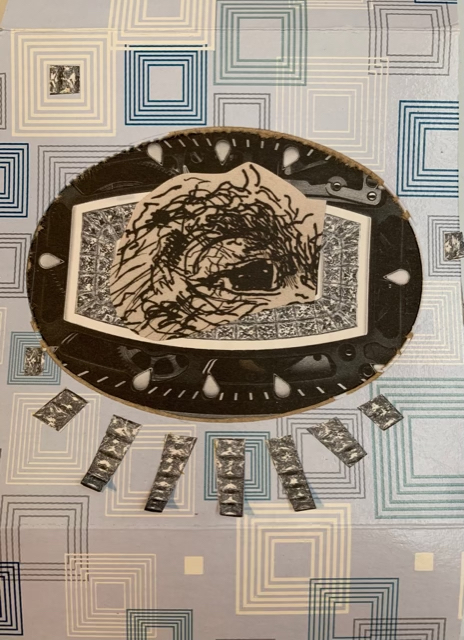 2021-08-05
2021-08-05Recovery Justice Mail Art
I See Dedication I See Hope I See Love We are all suffering illness, sadness, loss of the way we think life should be– Using the cool patterns on the panels of tissue boxes, I thought that material appropriate. Most of these collaged images appropriate an eye form, much like the Turkish Evil Eye, when given as a gift it offers protection. In this project many 18th St. artists participated and a single art piece was sent out with mental health support materials for anyone who signed-up on our website. This has been an artist-driven 18th St. Arts supported and produced project also supported by Recovery Justice, Santa Monica and We Rise LA. Special thanks to Sara Daleiden and Sue Bell Yank at 18th St. –Melinda Smith Altshuler P.S. Honestly it has been an honor and a blessing to produce work for this project and also support our friends and neighbors who are suffering more than us. -
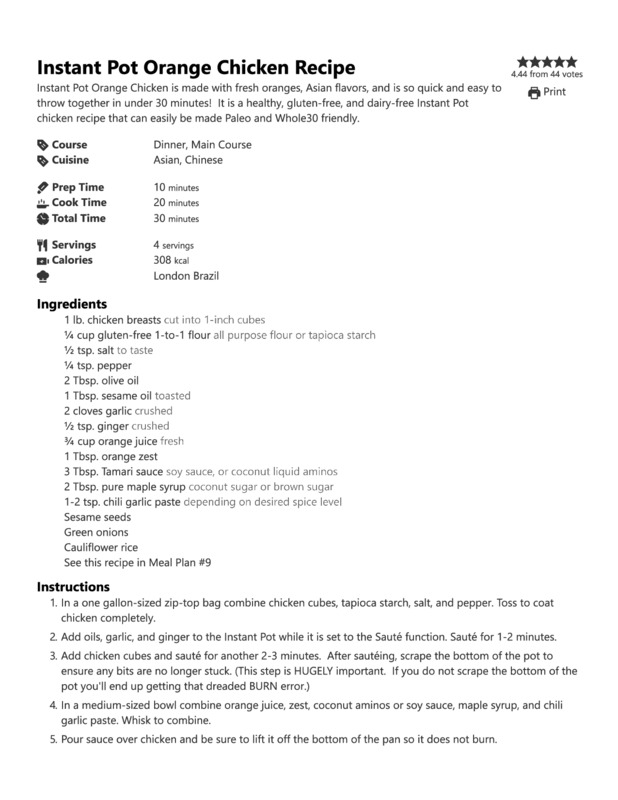 2020-04-09
2020-04-09Pandemic Dinner of Gluten-Free Orange Chicken is a Sensory Reminder of Evolving Grocery Shopping and the Effect on My Mental Health
Pre-Pandemic, my small family of three went shopping altogether at our local Frys Grocery every Sunday. As the type of person that lives inside their head and has difficulty multi-tasking when distracted, this was usually an overwhelming experience. It involved avoiding people parked sideways in aisles, answering questions from my wife and daughter (somehow usually at the same time), and being interrupted by loud intercoms. To me it was sensorial overload every week of my hearing and vision to the point where I wanted to leave. When the pandemic really started up in April of 2020 my wife and I decided that my daughter should stay home and we would take turns shopping every week individually to decrease the chances of affecting the employees, the other customers, and ourselves. Along with this was my increased effort to come up with meals and recipes on my "turn." The recipe attached, gluten-free orange chicken from https://www.evolvingtable.com, reminds me of this interesting evolution in shopping that still takes place, as it is my turn to shop today. While my wife looks upon the idea of shopping individually as a loss and misses it...I am able to shop without being overwhelmed. Between less customers in the store (due to ordering online and pick up), the store progressing to using handheld radios, and being by myself, I can really focus and no longer am stressed and overwhelmed to the point where I just want to leave. Every time I make this recipe and taste the delicious orange flavor and smell that hot sesame oil that I had never used before the pandemic, it reminds me of how a stressful pandemic has strangely (and selfishly) made one recurring weekday of my life less stressful. -
 2020-04-20
2020-04-20Nature can boost your mental health during COVID-19 pandemic
The pandemic has negatively affected many individuals' mental health. This article describes the benefits nature can provide in improving one's mental health during this time. -
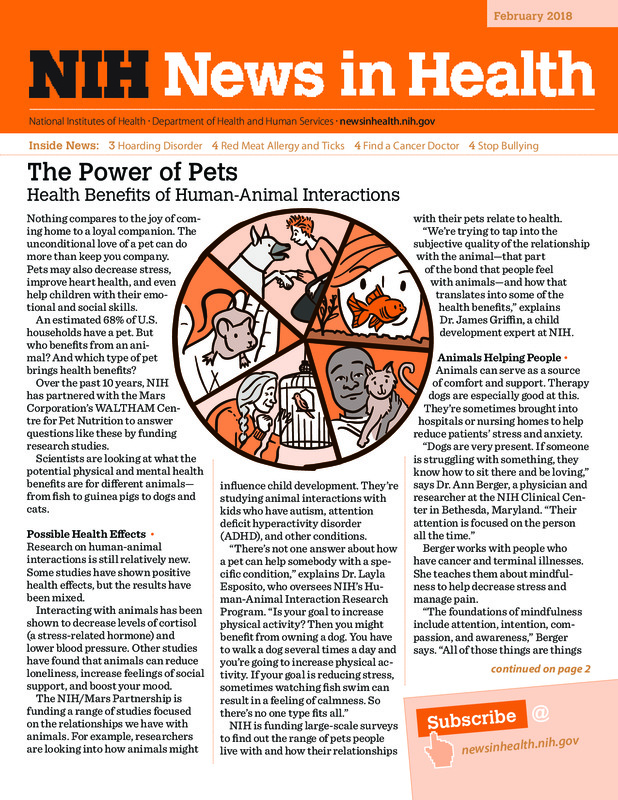 2018-02
2018-02The Power of Pets: Health Benefits of Human-Animal Interactions
This story shares how pets help people with their mental health in a variety of ways. Pets were vital in helping people with their mental and physical health during the pandemic. This article, while written pre-pandemic, shows the different ways in which pets are beneficial. -
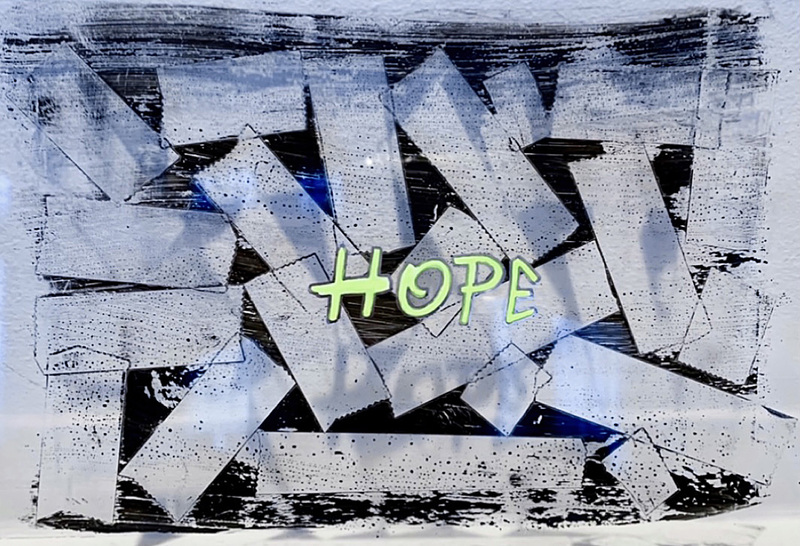 2021-07-21
2021-07-21Hope Love Heal
“Hope Love Heal” is a series of 30 separate artworks. Each mail art piece was made with the hope that it would inspire the recipient to seek out mental health care as one way of dealing with the pandemic. Each artwork was hand made with love. -
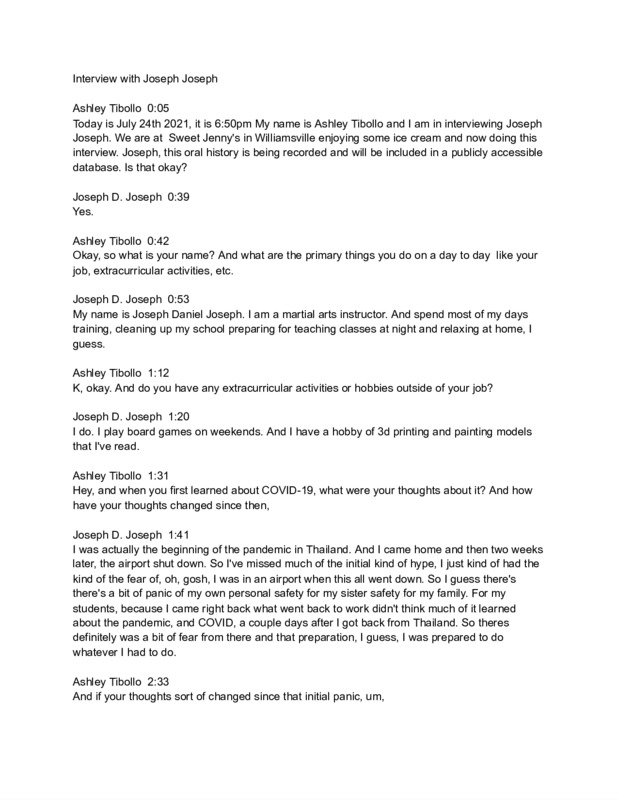 2021-07-24
2021-07-24Joseph D. Joseph, Oral History, July 24, 2021
Ashley Tibollo sits down with Joseph D. Joseph in an ice cream shop in Buffalo, New York to discuss how his life has been affected by the COVID-19 pandemic. In this interview, Joseph describes changes in his day-to-day routine, his life as a martial arts instructor, and changes in his economic status. He also discusses his students and how the pandemic affected them. In the last part of this interview, Joseph discusses his views on politics and what he hopes the future generations will learn about the response to this pandemic. -
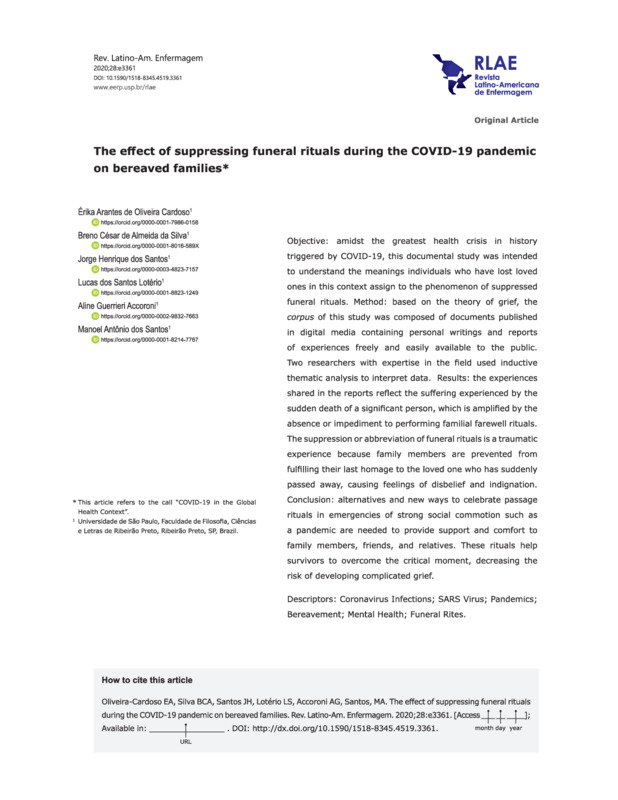 2020-04-28
2020-04-28The effect of suppressing funeral rituals during the COVID-19 pandemic on bereaved families*
This documental study was intended to understand the meanings individuals who have lost loved ones in this context assign to the phenomenon of suppressed funeral rituals. -
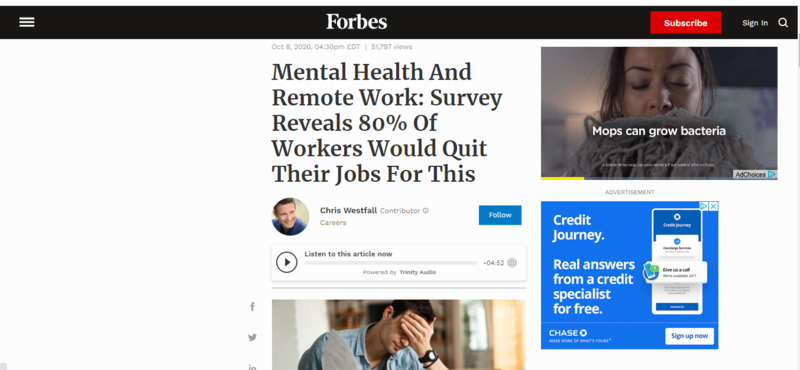 2021-07-23
2021-07-23Mental Health And Remote Work: Survey Reveals 80% Of Workers Would Quit Their Jobs For This
Teleworkers during the pandemic have experienced mental health challenges. For some individuals, working from home during the pandemic has increased their anxiety and stress levels. They have found it difficult to unplug from work, work longer hours at home than they did in the office, and struggle with the lack of social interaction. This article discusses ways that employers can support their employees and address their mental health struggles. -
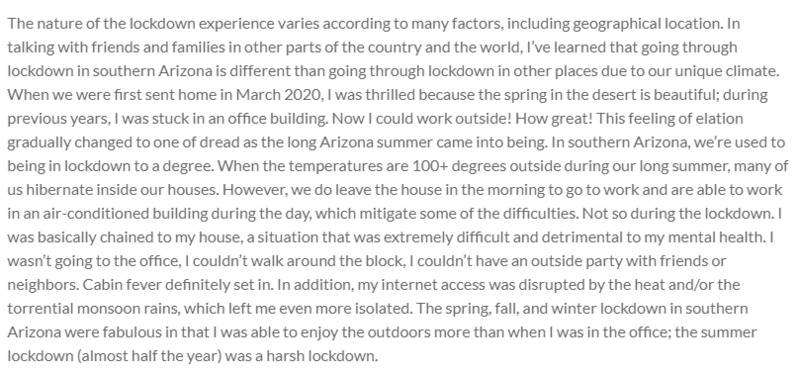 2021-07-23
2021-07-23Lockdown in Southern Arizona
The nature of the lockdown experience varies according to many factors, including geographical location. In talking with friends and families in other parts of the country and the world, I’ve learned that going through lockdown in southern Arizona is different than going through lockdown in other places due to our unique climate. When we were first sent home in March 2020, I was thrilled because the spring in the desert is beautiful; during previous years, I was stuck in an office building. Now I could work outside! How great! This feeling of elation gradually changed to one of dread as the long Arizona summer came into being. In southern Arizona, we’re used to being in lockdown to a degree. When the temperatures are 100+ degrees outside during our long summer, many of us hibernate inside our houses. However, we do leave the house in the morning to go to work and are able to work in an air-conditioned building during the day, which mitigate some of the difficulties. Not so during the lockdown. I was basically chained to my house, a situation that was extremely difficult and detrimental to my mental health. I wasn’t going to the office, I couldn’t walk around the block, I couldn’t have an outside party with friends or neighbors. Cabin fever definitely set in. In addition, my internet access was disrupted by the heat and/or the torrential monsoon rains, which left me even more isolated. The spring, fall, and winter lockdown in southern Arizona were fabulous in that I was able to enjoy the outdoors more than when I was in the office; the summer lockdown (almost half the year) was a harsh lockdown. -
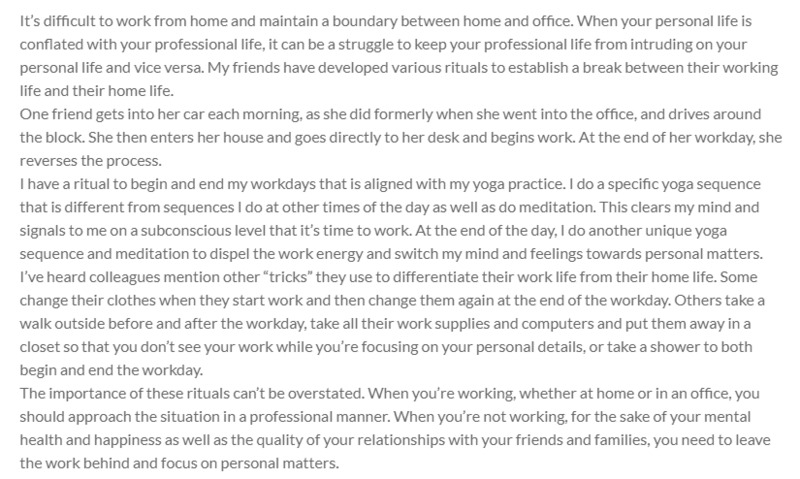 2021-07-23
2021-07-23Boundaries Between Home and Office
It’s difficult to work from home and maintain a boundary between home and office. When your personal life is conflated with your professional life, it can be a struggle to keep your professional life from intruding on your personal life and vice versa. My friends have developed various rituals to establish a break between their working life and their home life. One friend gets into her car each morning, as she did formerly when she went into the office, and drives around the block. She then enters her house and goes directly to her desk and begins work. At the end of her workday, she reverses the process. I have a ritual to begin and end my workdays that is aligned with my yoga practice. I do a specific yoga sequence that is different from sequences I do at other times of the day as well as do meditation. This clears my mind and signals to me on a subconscious level that it’s time to work. At the end of the day, I do another unique yoga sequence and meditation to dispel the work energy and switch my mind and feelings towards personal matters. I’ve heard colleagues mention other “tricks” they use to differentiate their work life from their home life. Some change their clothes when they start work and then change them again at the end of the workday. Others take a walk outside before and after the workday, take all their work supplies and computers and put them away in a closet so that you don’t see your work while you’re focusing on your personal details, or take a shower to both begin and end the workday. The importance of these rituals can’t be overstated. When you’re working, whether at home or in an office, you should approach the situation in a professional manner. When you’re not working, for the sake of your mental health and happiness as well as the quality of your relationships with your friends and families, you need to leave the work behind and focus on personal matters.
